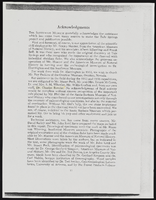Search the Special Collections and Archives Portal
Search Results

Transcript of interview with Gerald Gordon by Barbara Tabach, November 02, 2016
Date
Archival Collection
Description
In 1961, at the age of thirteen, Gerald ?Jerry? Gordon became a bar mitzvah. This typical coming of age celebration was unusual in that he had simultaneously studied in both his home state of California and his adopted home of Las Vegas, where he spent summers with his grandparents. 1961 is also the same year that the Gordons made Las Vegas their permanent home. Jerry graduated from Las Vegas High School, attended University of Nevada, Las Vegas and earned his law degree from University of California, Los Angeles. His gregarious and trustworthy personality led him to career building steps in the legal community of Las Vegas that included illustrious names such as Louis Wiener, Jr., David Goldwater, Neil Galatz, and many others. His personal law specialty became bankruptcy, especially dealings with hotel/casinos. As a member of the Jewish community, Jerry?s energy and expertise to organize was instrumental in the construction of Congregation Ner Tamid, the reform synagogue, at its site on Valle Verde and I-215. It was a multi-year process and includes a vast array of stories?a cash donation from Moe Dalitz, finalization of receiving of a donation land from the Greenspun family during the High Holy Days, and the ongoing challenges of a building campaign during a recession. In addition, he explains that CNT included two unique negotiations: 1) a cell tower and 2) a solar field on the synagogue?s property. Jerry and his wife Yvonne met while attending UNLV. Yvonne taught math at various levels in the Clark County School District. They raised their two children, Sara and Jeffrey, in Las Vegas, and forged an important role together in Congregation Ner Tamid. In April 2017, they were among those honored for their work with the synagogue.
Text
Matteson-Kane, Maureen
Maureen Matteson-Kane is Professor Emeritus of Nursing at the University of Nevada, Las Vegas (UNLV). She taught at the UNLV School of Nursing from 1977 to 2004. She holds a Master of Science in Nursing.
Person
Jean Rambo appointment letter and certificate for the State Health Coordinating Council, 1981 October
Level of Description
Archival Collection
Collection Name: History of Nursing in Southern Nevada Oral History Project Records
Box/Folder: Box 01 (Restrictions apply)
Archival Component

Transcript of interview with Lovee duBoef Arum by Barbara Tabach, November 1, 2016
Date
Archival Collection
Description
Lovee Arum is the Chief Financial Officer of the Morris A. Hazan Family Foundation and Director of Hospitality for her husband Bob Arum?s boxing promotion company Top Rank. She holds a Nevada Real Estate Broker Sales License and was a partner in Western Linen (a Las Vegas linen rental and laundry company) for many years. Arum is a volunteer and philanthropist in the Las Vegas, Nevada community and works with organizations such as Temple Beth Sholom and the Nathan Adelson Hospice. In this interview, Arum reflects upon her childhood in Beverly Hills, California, and first experiencing Las Vegas after her father, Morris Hazan, established Western Linen. She discusses adjusting to Las Vegas life after moving to the city with her first husband, Larry duBoef, in 1963, and raising her daughter and son within the local Jewish community. Arum also talks about meeting her current husband, Bob Arum, and her various philanthropic activities, including Junior League, United Jewish Appeal, Keep Memory Alive and establishment of the Lou Ruvo Center for Brain Health.
Text
Audio clips from interview with Doris, Gerald and Marcy Welt, November 30, 2014
Date
Archival Collection
Description
Part of an interview with Doris, Jerry and Marcy Welt on November 30, 2014.
Sound
Audio clips from interview with Renee Diamond, November 20, 2014
Date
Archival Collection
Description
Parts of an interview with Renee Diamond on November 20, 2014. In these clips, Diamond talks about her involvement with politics from the moment she and her family arrived in Las Vegas in the 1970s.
Sound
Audio clips from interview with Barbara Raben, February 24, 2015
Date
Archival Collection
Description
Audio clips from an interview with Barbara Raben. In these clips, Raben discusses moving to Las Vegas in 1991 and discovering the Jewish community here.
Sound

